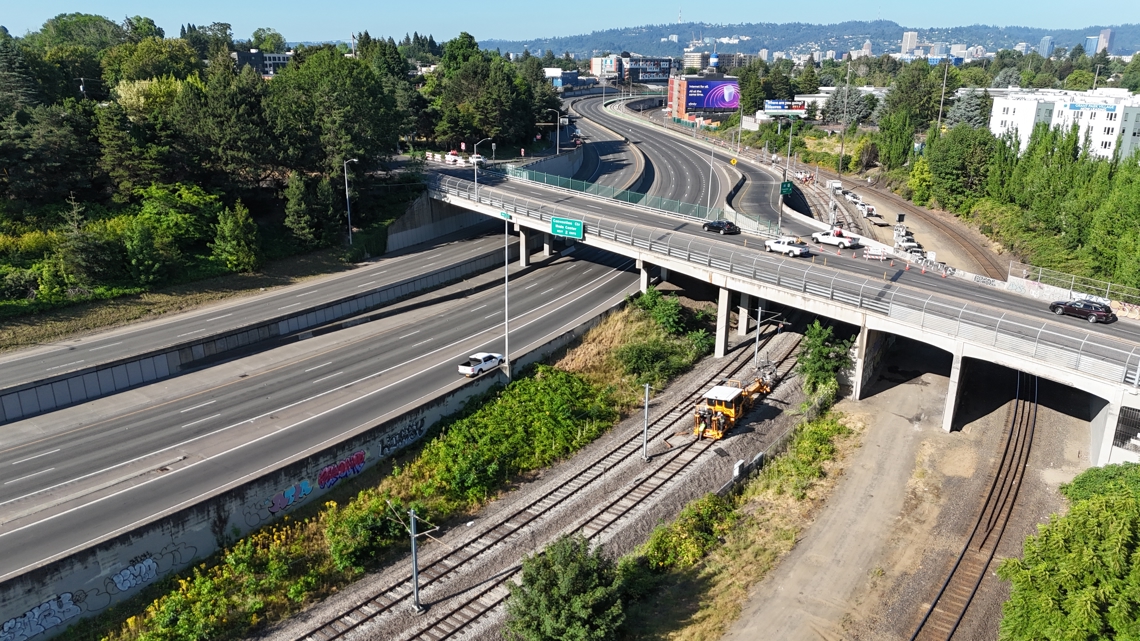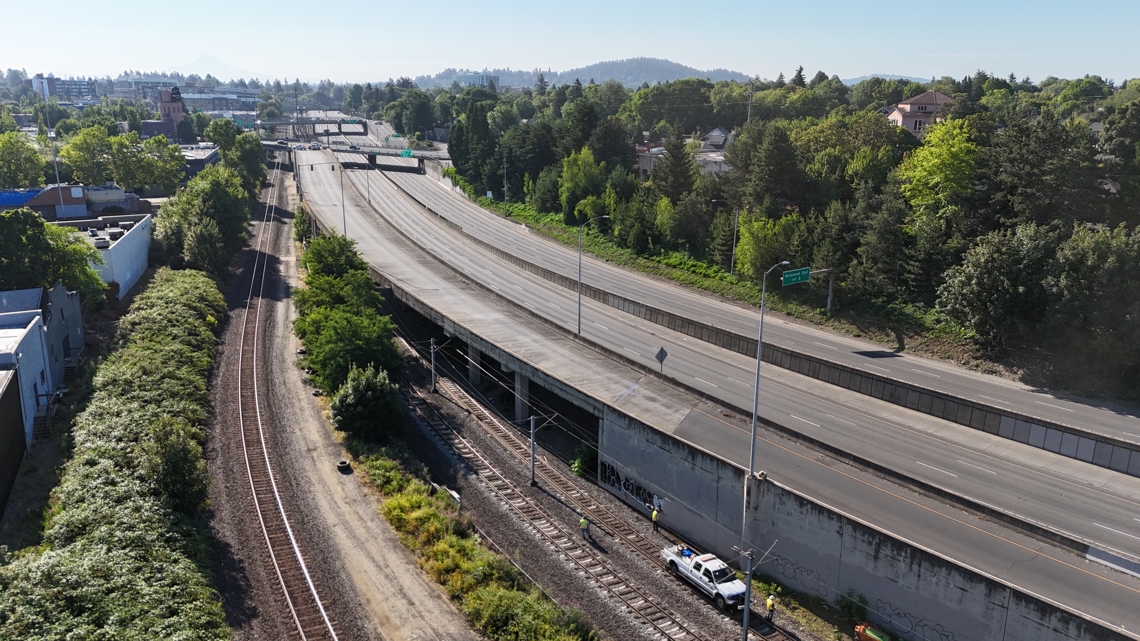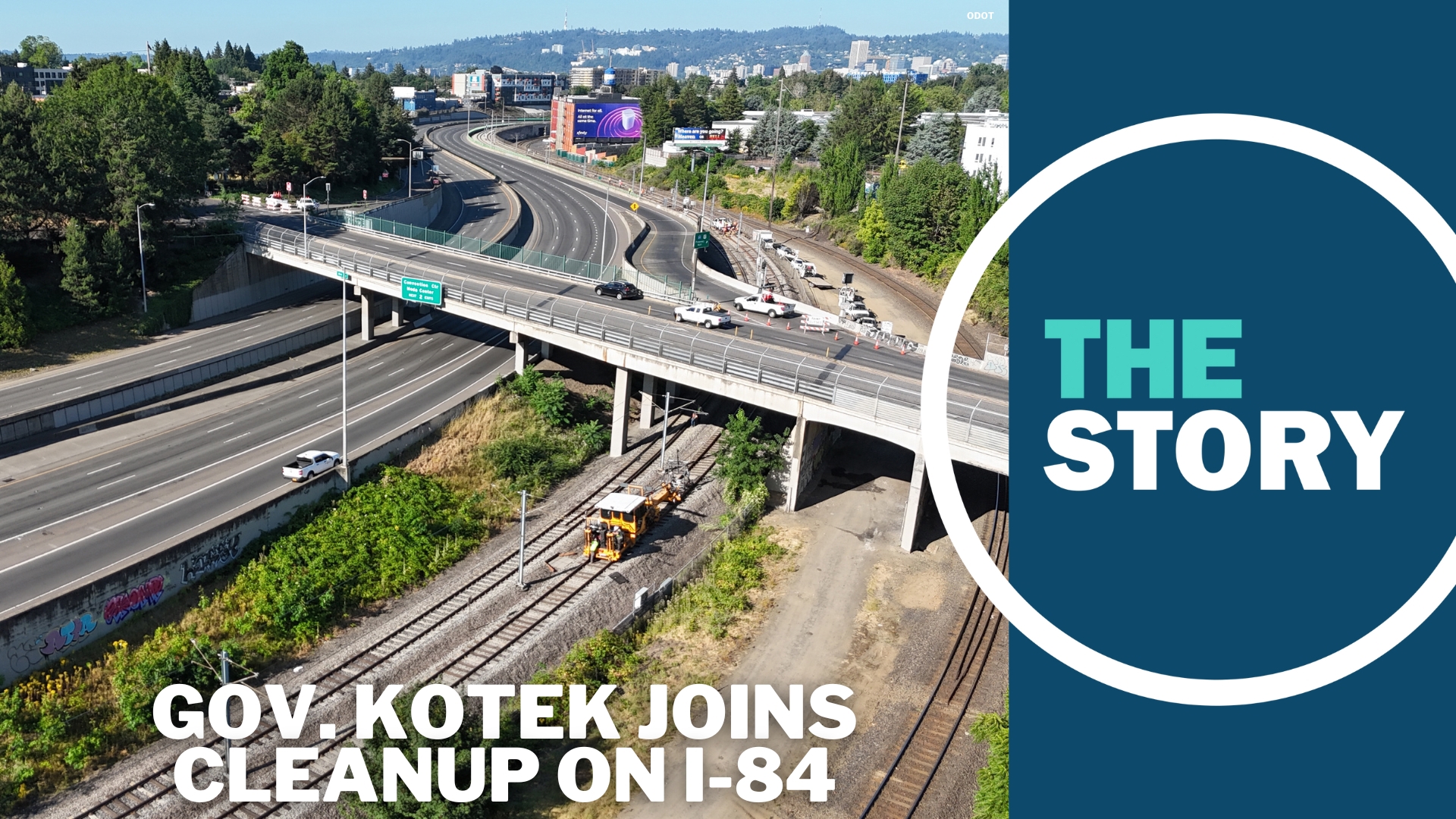PORTLAND, Ore. — Oregon Governor Tina Kotek paid a visit over the weekend as road crews shut down a stretch of I-84 for a major cleanup of the area, long notorious for graffiti and trash that littered the hillside along Sullivan's Gulch.
During the 2024 legislative session, lawmakers approved $20 million for the Oregon Department of Transportation to clean up highways in the Portland area, including removal of trash and homeless camps. That funding included $4 million specifically earmarked for graffiti removal.
This weekend's shutdown on I-84 was intended to be a big step forward in this effort. A five-mile stretch of the interstate was closed from Saturday night into Sunday for a total of 13 hours so that crews could remove graffiti and pick up trash without having traffic to contend with.
It was no easy task. To shut down the highway that long, ODOT had to coordinate with TriMet, the Portland Bureau of Transportation, Metro, Multnomah County and the Union Pacific Railroad — but the agency concluded that it was worth the effort.
The targeted stretch of I-84 between I-5 and I-205 is one of the first things visitors see when they land at the Portland International Airport and come into the city.
Gov. Kotek, who joined in the painting to cover up graffiti, told The Story's Pat Dooris that making the city look better was a priority that emerged from her Portland Central City Task Force last fall, and an issue she's heard about from people across the state.
RELATED: Gov. Kotek, Portland Central City Task Force release recommendations for revitalizing downtown
"This city is so important for the entire state," Kotek said. "I heard it all last year when I was on the road visiting all the counties ... 'What's happening to Portland? Is it gonna, you know, get back to its you know former glory?' This is a process. And we've all been through a lot, but this city matters. It matters to our economy, it matters for people around the state — and as governor, I have to be supportive, right? The Portland Central City Task Force was a message: As your governor, I care, we need to all work together, we can do things when we come together. And this is a perfect example of that."
Kotek told Dooris that she wants to see Portland live up to its glory days, and cleanup operations like these are a step in that direction.
"I have a very vivid memory of my first experience in Portland. It was 1987 when I moved out, and I was changing trains to go down to Eugene," Kotek recalled. "I was hanging around Old Town and ... having come from the East Coast, (I was thinking) 'This is a really clean city. Like, yeah it's a city — there's gonna be some trash and graffiti, but it's like, in general very clean.' That's the Portland that people remember, that's the Portland people want to see going forward. And it's one of the reasons people visit here. It's beautiful, the city's beautiful, we want to keep it that way."


Kotek said that the graffiti cleaned up along I-84 over the weekend had been allowed to build up for years. ODOT Director Kris Strickler acknowledged that, even after a concerted cleanup effort like this one, there's no way to guarantee it won't come right back.
"Our efforts are to continue to attack that problem, because the problem is a societal problem for all Oregonians, and everybody's experiencing the impact of that," Strickler said. "While I can't guarantee you that it won't come back in near-term, I will guarantee you that it won't be as bad as it has been, and our crews are committed to continuing to provide that effort and provide that service so that we can continue to attack the problem."
For Kotek's part, she said she'd like to see programs that can provide other avenues for would-be taggers.
"I also hope people will put that passion into something else somewhere else. Because that's passion, right? someone really cares about what they're doing. How about we find a different place to do that, and not along a roadside," she said.
According to Kotek's office, ODOT crews involved in the cleanup of I-84 picked up 258 bags of garbage, hauling away a collective 1,060 pounds of litter. PBOT reported painting over 70,000 square feet during the closure.
From July 10-12, crews from Metro's RID Patrol were also removing garbage along railroad tracks between Northeast Martin Luther King Boulevard and Northeast 28th Street, picking up 9,760 pounds of garbage, according to Kotek's office.


The new landscape of homelessness
Portland's highway cleanup comes at the same time that the city embarks on a new prohibited camping ordinance. Enforcement was supposed to begin at the outset of July, but was put on hold during the worst of the recent heat wave. The ordinance has yet to be much of a game-changer for the city, but it's unclear whether that is a result of the pause or not.
Dooris asked Kotek about the ordinance, which was carefully drafted to follow a state law, House Bill 3115 — a bill Kotek championed while still speaker of the Oregon House.
"I think the new ordinance in the city of Portland is in alignment with the law ... there's been a restriction on camping in high-risk corridors for quite a while, and I think the city's been enforcing that, and I think that's appropriate," Kotek said. "I think common sense, everyone would say that is reasonable and objective to say camping along the roadside like this is very dangerous, and I think they should be enforcing that. So the legislature's gonna take it up. What I'm focusing on is, does the current ordinance work? Is it being enforced fairly, and are we making progress? And I think the city's in a better spot than they were in a previous version."
RELATED: Oregon lawmakers hint at possible HB 3115 update after Supreme Court ruling on homeless camping
But with the U.S. Supreme Court having overturned pivotal court decisions that underpinned HB 3115 at the time it was passed, there is new speculation as to whether it should remain in place. Kotek did not give her opinion on what should be done.
"I think that's the conversation the legislature has to have," she said. "How has it been working? ... It was on hold, waiting for the Supreme Court to rule on Grants Pass, but the goal here is whatever we do, let's be clear with folks, let's make sure people are attached to services and help them get into shelter. And I think, you know, it's working."

